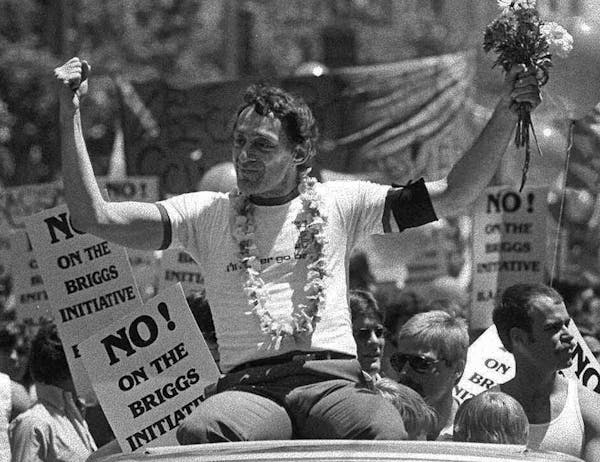To mark the 35th anniversary of the killing of Harvey Milk, the San Francisco Gay Men's Chorus and the Twin Cities Gay Men's Chorus (along with several other gay choruses) co-commissioned a 12-movement oratorio from Tony-nominated composer Andrew Lippa.
The chorus gave the regional premiere of the work Friday night at Ted Mann Concert Hall in Minneapolis.
The outspoken Milk is an icon of the gay rights movement, the first openly gay man elected to public office, to the San Francisco Board of Supervisors, in 1977. He was assassinated in 1978, along with San Francisco Mayor George Moscone.
The oratorio didn't attempt to tell a linear story, but offered glimpses into Milk's life. The lack of a narrative arc left it emotionally flat.
Things got off to a great start with the Young Harvey, played magnificently by Minnesota Boychoir member Quinn Morrissey, dreaming of his life as "An Operatic Masterpiece."
But Milk's murder was handled in the second number — and from the perspective of the bullet. The killing became something abstract, distancing us from feeling any strong reaction.
One of the highlights, "Thank You, Mrs. Rosenblat," engendered just that kind of reaction. In it, Young Harvey and the adult Harvey (Nathan Croner) movingly thanked a teacher. She was sung by Elisabeth Comeaux, a stellar presence, singing a multitude of roles, all of them effectively.
Two strong sections were "Friday Night in the Castro," a faux disco number, and "San Francisco," an ode to the gay mecca. But like too much of the oratorio, each felt overly generic, with little specific connection to Milk.
The piece ended on a high note, with "Tired of the Silence," a speech where Milk exhorted his audience to come out. Here, Croner came into his own, capturing Milk's passionate idealism. If only the rest of the piece had connected in this way.
Under the baton of artistic director Ben Riggs, the chorus gave a strong performance, one of musical proficiency and great commitment.
But in the end, "I Am Harvey Milk" did not do justice to its subject.
In the first half of the program, the chorus sang numbers in a similar thematic vein. They were joined by Allegro, a small group from the Minnesota Boychoir, who more than held their own in the adult company.
William Randall Beard writes about music and theater.
In heated western Minn. GOP congressional primary, outsiders challenging incumbent

Minnesota Sports Hall of Fame: A class-by-class list of all members

This retired journalist changed professional wrestling from Mankato

